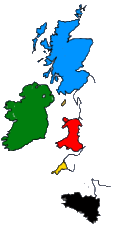Labour Party idea of federalism not the answer for the Celtic nations

The Labour Party’s idea of federalism offers little hope for the people of the Celtic nations. In many ways it is too late for Labour to play the federalism card and particularly in Scotland it is not likely to stem the hemorrhaging in their support. Their decline has been quite startling. Once Labour in Scotland, before the growth of the Scottish National Party (SNP), dominated political life. Now Labour’s leader in Scotland, Richard Leonard, has just quit the post after three years. Many will point out that under his leadership their six MPs were reduced to a single representative in the UK parliament in the 2019 general election. There are 59 Scottish seats in the UK House of Commons. However, the decline in support for Labour in Scotland pre-dates Richard Leonard. In the 2016 Scottish Parliament election, Labour lost a third of its seats, dropping from 37 to 24. Labour got its lowest percentage of the vote in Scotland in 98 years with 23% and fell into 3rd place.
For a period of time, from the middle of the 20th century to the early 21st, Labour’s hold over politics in Scotland appeared insurmountable; winning the largest share of the vote in Scotland at every UK general election from 1964 to 2010, every European Parliament general election from 1979 to 2004 and in the first two elections to the Scottish Parliament in 1999 and 2003. However, there are those who accused Labour of arrogance and taking Scottish voters' support for granted during this period. Not least in hastening the Labour demise in Scotland was its obsequious relationship and capitulation to the will of London-centric Labour Party. It went beyond supporting the union of the so-called "United Kingdom", to a point where Labour could be accused of not caring about the aspirations of the Scottish people.
This approach by Labour has not just been confined to Scotland. The Labour Party in Wales can also be accused of the same thing. Welsh Labour would be wise to look at the mistakes of Scottish Labour as it seeks to shore up its own support in Wales. However, this is not likely to happen. The Welsh Labour leadership are committed to continue to support the union even at a time when there is growing support for an independent Wales, even among many Labour voters and members. Like Labour in Scotland, they will do whatever it takes to undermine any movement towards independence. The latest ploy by Labour in Wales and Scotland is to once again wheel out the tired idea of a federal United Kingdom. They describe it as an attempt to devolve more power out of London to the most local level. They might describe it as a federal system with more power for the 'nations' and regions, but really they don't hold to the idea of Scottish and Welsh nationhood. They appear to be content with the 'nations' of Scotland and Wales being regions of England.
So we need to be wary of these ideas of federalism being promulgated by some in Scottish and Welsh Labour. It is an idea supported by the UK Labour leader Keir Starmer. The latest to express support for the idea is Mick Antoniw Welsh Labour Member of the Senedd (Senedd Cymru - the Welsh Parliament). He has recently co-authored a report on what is described as "Radical Federalism" suggesting the need for “decentralisation of power” and for the UK to be “a voluntary union of nations”. Wales’ First Minister Mark Drakeford recently launched the report. The problem with the report and also the idea of federalism being supported by the Labour leadership in Britain is that its focus is on what is necessary to save and preserve the union of the United Kingdom rather than what is necessary to improve the lives of people in Scotland and Wales.
The Labour proposals for a federal UK has been rightly criticised by Adam Price, the leader of the Welsh political party Plaid Cymru as well as supporters of an independent Scotland. They point out that the only way to protect Wales and Scotland’s interests is for them to become independent. The idea of federalism as a spoiling tactic at a time of growing support for independence has been used before by Labour. Not least when they, along with the UK Conservatives and Liberal Democrats, offered federalism in the so-called “vow” shortly before the 2014 referendum on Scottish independence. At that time the three Westminster party leaders promised “extensive new powers” for the Scottish Parliament if people voted against independence. It was a promise that was broken.
Keir Starmer, the leader of the British Labour Party, has expressed his total opposition to an independent Scotland. He has also made it clear that he is against the Scottish people exercising their democratic right to hold a referendum on the question of independence any time soon. The only thing he has been prepared to offer the people of Scotland was a “UK-wide Constitutional Commission to consider how power, wealth and opportunity can be devolved to the most local level”. These ideas of federalism from Labour need to be seen for what they are, a desperate attempt to sabotage any desire for independence. It comes at a time when for the last 18 successive opinion polls the people of Scotland have consistently shown support for independence. Some polls showed 58 percent in favour and an even higher number in support of a referendum. It is clear that the political and economic benefits that would come from an independent Scotland and Wales are of no interest to the present leadership of the Labour Party.






